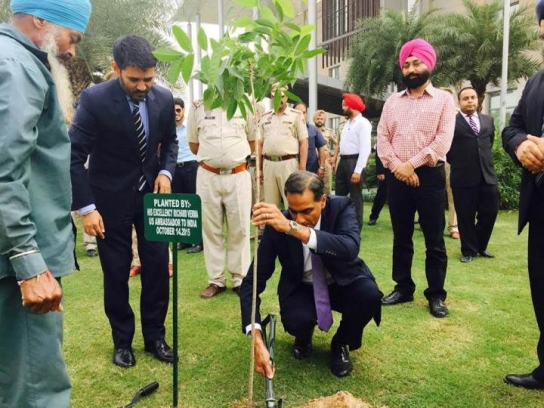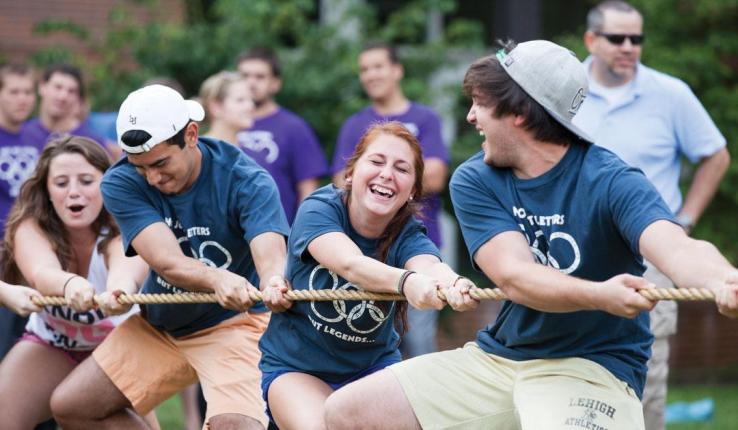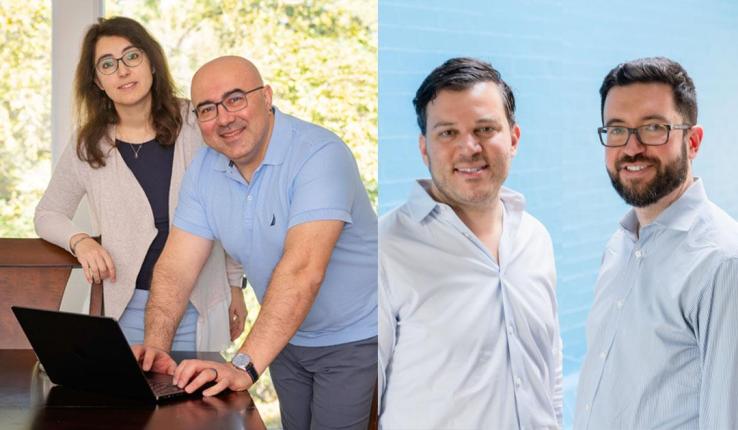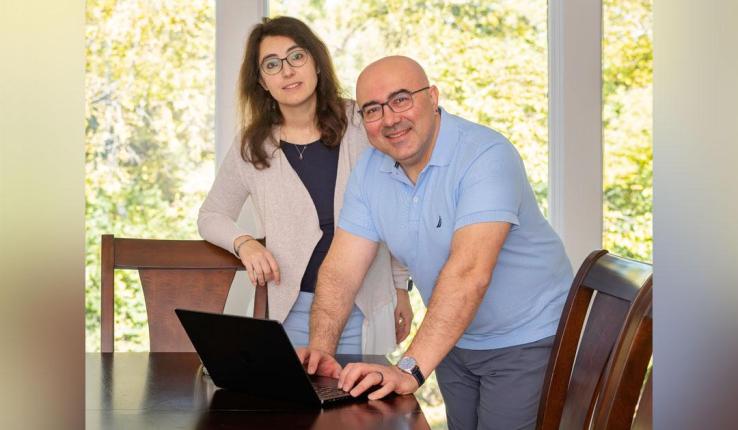An Envoy “Most Consequential”
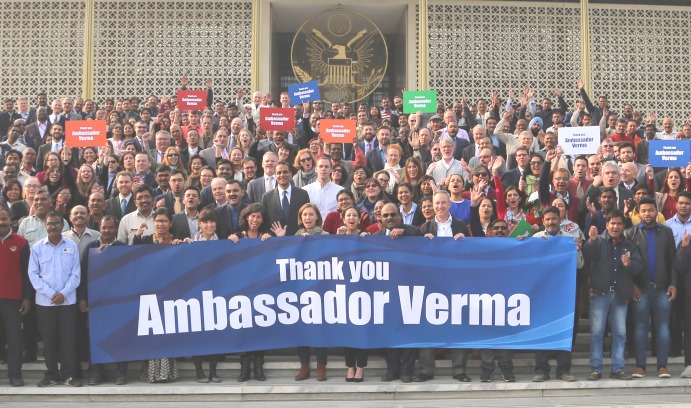
The employees of the American Embassy in New Delhi threw a farewell party for Richard Verma ’90 (directly behind the outstretched hand above the letter 'T') when he stepped down in January after two years as U.S. ambassador to India. (Photo courtesy of U.S. Embassy in New Delhi)
When the world’s two largest democracies cooperate, Richard Verma ’90 likes to say, other nations benefit.
“India and the United States are natural allies,” says Verma. “Between our two countries, we have 1.6 billion people living in democratic systems with open and transparent governments that have checks and balances and believe in the rule of law and in resolving disputes peacefully.
“A positive ripple effect occurs whenever India and the U.S. come together. This is good for people everywhere who care about peace, open markets and prosperity.”
Few people have worked as hard as Verma in recent years to bring the U.S. and India closer together. From 2015 to 2017, Verma served as U.S. ambassador to India. During that time, the two nations launched more than 100 new initiatives in areas ranging from clean energy and health to transportation and space exploration. Verma managed nine face-to-face meetings and three full-scale summits between former U.S. President Barack Obama and Indian Prime Minister Narendra Modi.
Verma, who earned a B.S. in industrial engineering with a minor in international relations from Lehigh, was appointed to the ambassadorship by Obama and approved unanimously by the U.S. Senate. He resigned his post in January at the request of incoming President Donald Trump.
Verma has won wide praise for his efforts to improve ties between the U.S. and India.
“During his time in New Delhi,” Forbes magazine said in a five-page article, “Verma established himself as one of the most consequential envoys ever to occupy the prestigious post.
“The first Indian-American to serve in the role, Verma leaves behind a far-reaching legacy. He presided over the two most transformational years in the U.S.-India strategic partnership…and raised the partnership to unparalleled heights in virtually every arena of bilateral cooperation while serving as a skilled and talented public diplomat.”
The Indian Express, which publishes newspapers in a dozen cities, wrote in an online article that Verma “saw a fresh momentum in ties during his term…There have been some substantive outcomes. This is particularly true for defense, where India was granted major defense partner status, and New Delhi…signed the Logistics Exchange Memorandum of Agreement with the U.S., which will allow their militaries to work closely and use each other’s bases.”
For his own part, Verma says that relations between India and the U.S. progressed “at a pace that was somewhat unprecedented.” Foreign investment by the U.S. in India set a record as did two-way trade, which reached $110 billion a year. The number of American companies doing business in India topped 500, and a record number of Indian students were issued visas to study at American colleges and universities.
Military ties grew stronger as well. Defense sales exceeded $15 billion for the first time. India conducted more joint military exercises with the U.S. than with any other country, and the U.S. officially designated India a “Major Defense Partner.”
More than “transactional” partners
Much of the credit for these achievements, Verma said in a recent interview, is owed to the friendship forged by Obama and Modi and to the employees of the American Embassy in New Delhi and the four U.S. consulates in India.
The successes of the last two years, he said, give cause to hope that the U.S. and India have moved beyond what he calls a “transactional relationship.
“Rather than thinking of the relationship in terms of ‘what’s in it for me,’ we should be thinking of what we can do to make each other better and stronger,” he said. “I’m confident that the fundamentals in our relationship are really sound. We should continue to be vested in each other’s success.”
During his time in India, Verma visited all 29 of the country’s states, meeting with Indian citizens as well as American students and business officials. He gained a reputation for his ability to listen and for the yellow legal pad he filled with notes wherever he went.
“You have to understand other people’s viewpoints before you advance your own,” he said. “Listening is a huge part of this job. I like to think that we did the job quietly and without a lot of fanfare.”
In April 2016, Verma visited Lehigh to give an update on U.S.-India relations in an address titled “Technology, Innovation and American Diplomacy in the 21st Century.”
Last fall, he discussed the relationship in a Q and A feature in Resolve, the magazine of the P.C. Rossin College of Engineering and Applied Science at Lehigh.
Verma has been appointed SFS Centennial Fellow at Georgetown University’s Walsh School of Foreign Service. He and his wife, Pinky Verma, will remain in India until June to allow their three children to finish the school year.
“This has been a really positive experience for my kids,” he said. “All three have studied Hindi and are picking up the language. They’ve seen things from the far reaches of the country—nature preserves, tigers, the Himalayas. They’ve been so warmly welcomed here; I’m really grateful for that.”
The opportunity to live in his ancestral homeland—his parents are from the Indian state of Punjab—was “humbling and inspiring,” Verma said.
“I always tell high school and college kids that they won’t know how to lead in today’s world unless they know where they’re from. I gained a first-hand appreciation of my roots. I’m proud of those roots, and proud of the journey that my parents made and the risks they took to find a better life.
“My family’s story is a great immigrant story, a great American story. Because my parents worked so hard and were helped by so many people, I’ve always felt a certain obligation to do my best.
“This experience has been very gratifying for me, personally and professionally.”
Story by Kurt Pfitzer
Posted on:


